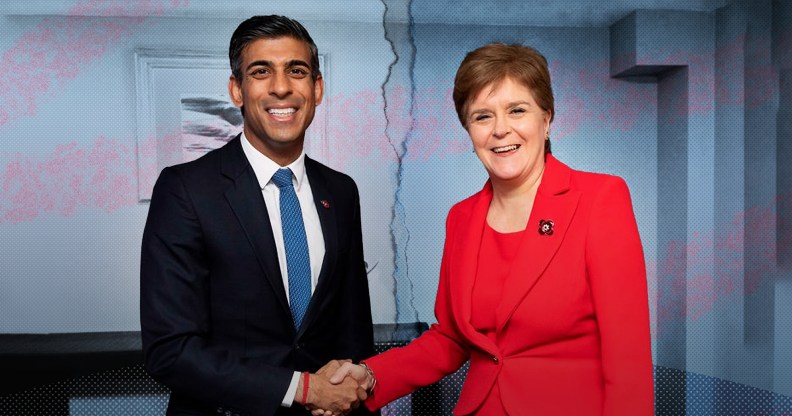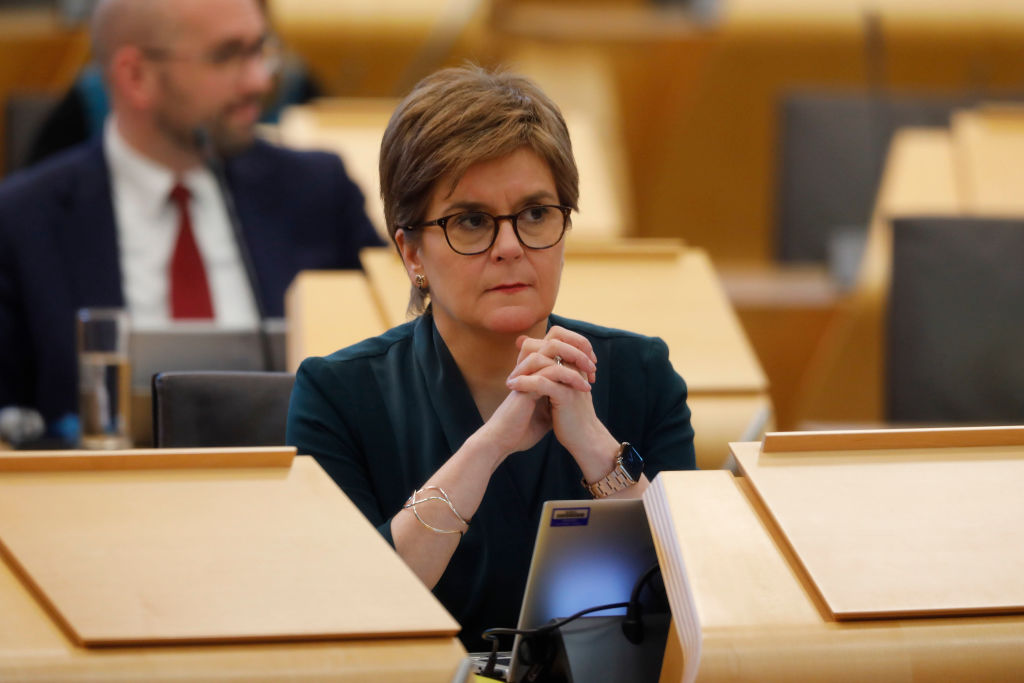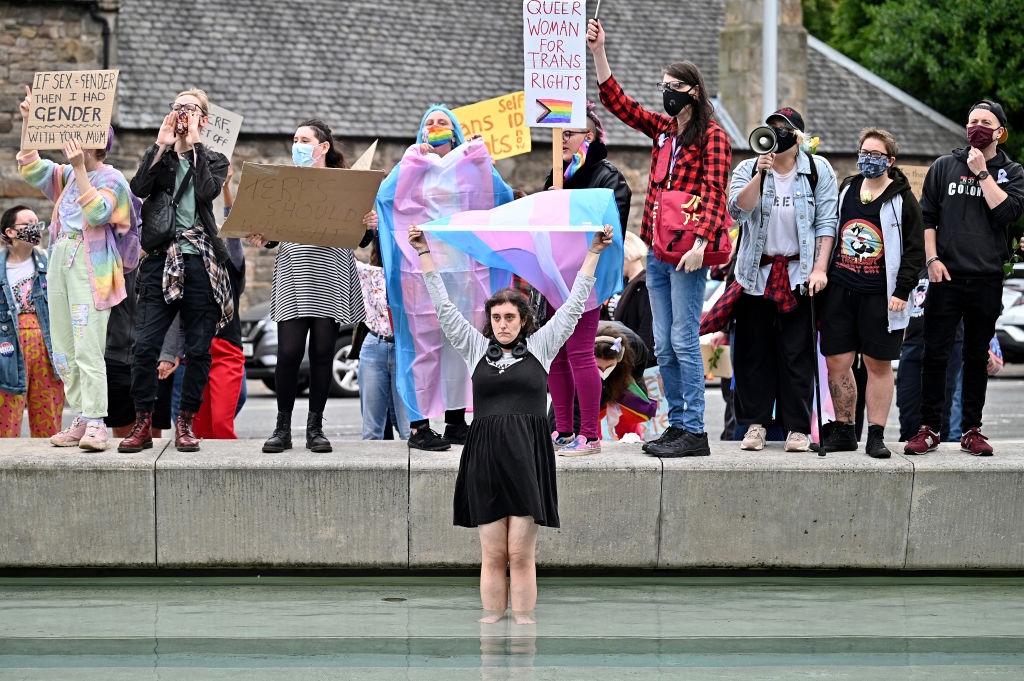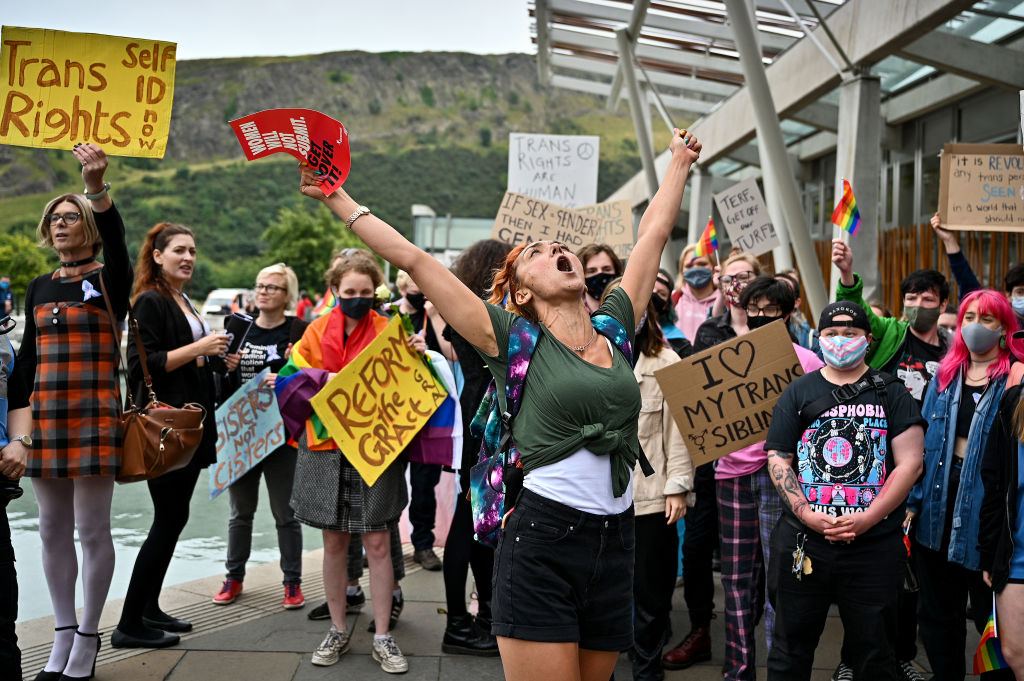Tory government could trigger constitutional crisis by blocking Scotland gender bill, says MSP

The UK government could “wreck devolution” and cause a constitutional crisis if it tries to block gender recognition reform in Scotland. (Getty/PinkNews)
A Greens MSP has warned that the Tory government in Westminster could “destroy devolution” if it tries to block Scotland’s landmark gender reform bill passed in Holyrood.
In December, the Scottish Parliament voted in favour of the Gender Recognition Reform (Scotland) Bill, a piece of legislation that would allow trans people to update the gender marker on their birth certificate without the need for a medical diagnosis, among other simplifications.
Within hours, the UK government had threatened to block the legislation by invoking Section 35 of the Scotland Act, which would stop the bill from getting royal assent and would mark a first in history.
Maggie Chapman, equalities spokesperson for the Scottish Greens, has warned that the UK government could trigger a bitter legal battle if it tries to block the legislation – and says it would prove once and for all that the government “doesn’t care about democracy”.
“If they actually go through with their threat to either block the bill from receiving royal assent or block the implementation of it… I think that signals that this becomes about something much more than the issue of self-declaration – this becomes a constitutional crisis, I think,” Chapman told PinkNews.
If the UK government does invoke Section 35, Chapman is “100 per cent certain” that the Scottish government would challenge the decision in court, resulting in a legal war that could set precedent for other cases.

“Section 35 has never been invoked so there is no precedent, there’s no case law to base any determination on – so the outcome of such a legal challenge by the Scottish government would be definitely uncertain, but it would also be highly consequential,” said Chapman.
Such a case could have far-reaching consequences, she warns – more than anything, it would cause “significant harm” to the UK government’s relationship with devolved nations.
“It would show very clearly that the so-called ‘union of equals’ is anything but and that actually the Tories are out to get devolution – that would certainly be my reading of it.”
I think that says something about the UK government’s willingness to use this issue to completely trample over human rights.
Chapman also believes such an intervention would look bad for the UK internationally – it would show the rest of the world loud and clear that the government is prepared to “trample over human rights”.
“If a government is prepared to wreck devolution, to ride roughshod over the rights of trans people, then what else are they willing to do? That’s actually quite scary, thinking about it in a bigger context.”

UK government intervention could drive support for Scottish independence
This threat to devolution comes as Nicola Sturgeon continues to push for a second independence referendum.
The Tories has so far refused to allow it – but many, including Chapman, believe that by blocking the gender reform bill, Rishi Sunak would only fuel the independence campaign.
“I think it certainly would become a tool in the independence campaign’s toolbox,” Chapman said.
“I think we’ve known for a while the level of contempt with which the UK government holds the Scottish parliament.
“If the Tories are prepared to do this then Scotland really needs out so we can secure the level of human rights that we think is appropriate for our country.”

The passage of the Gender Recognition Reform Bill has clearly enraged Conservatives in Westminster – Kemi Badenoch, minister for women and equalities, issued a statement shortly after the bill was passed expressing her “concerns”.
Weeks later, she announced a review of the list of accepted overseas gender certificates to ensure “the integrity of the Gender Recognition Act”.
While an equalities office spokesperson denied that review would affect Scotland, many saw it as an indication that the UK government was bracing to clamp down more broadly on self-identification – a model that’s been adopted by numerous countries and territories to make legal gender transition easier, including Ireland.
Chapman believes Badenoch’s review could go as far as to damage relations between the UK government and other nations.
“This is just an attack on trans people. It’s a blatant attack on the rights of trans people,” she added.

When approached for comment, a spokesperson for the equalities office said no decision has been made yet on a response to Scotland’s gender recognition reform.
“We share the concerns that others – including the Equality and Human Rights Commission and the UN Special Rapporteur on Violence Against Women and Girls – have set out with the Scottish bill, particularly around safety issues for women and children,” a spokesperson said.
“Our concerns include the protection of single sex spaces, and the checks and balances included in the process of gaining a legal gender recognition certificate.
“We are still considering our next steps, and also the ramifications for the 2010 Equality Act and other UK wide legislation. No decision has been made on a course of action at this time.”

